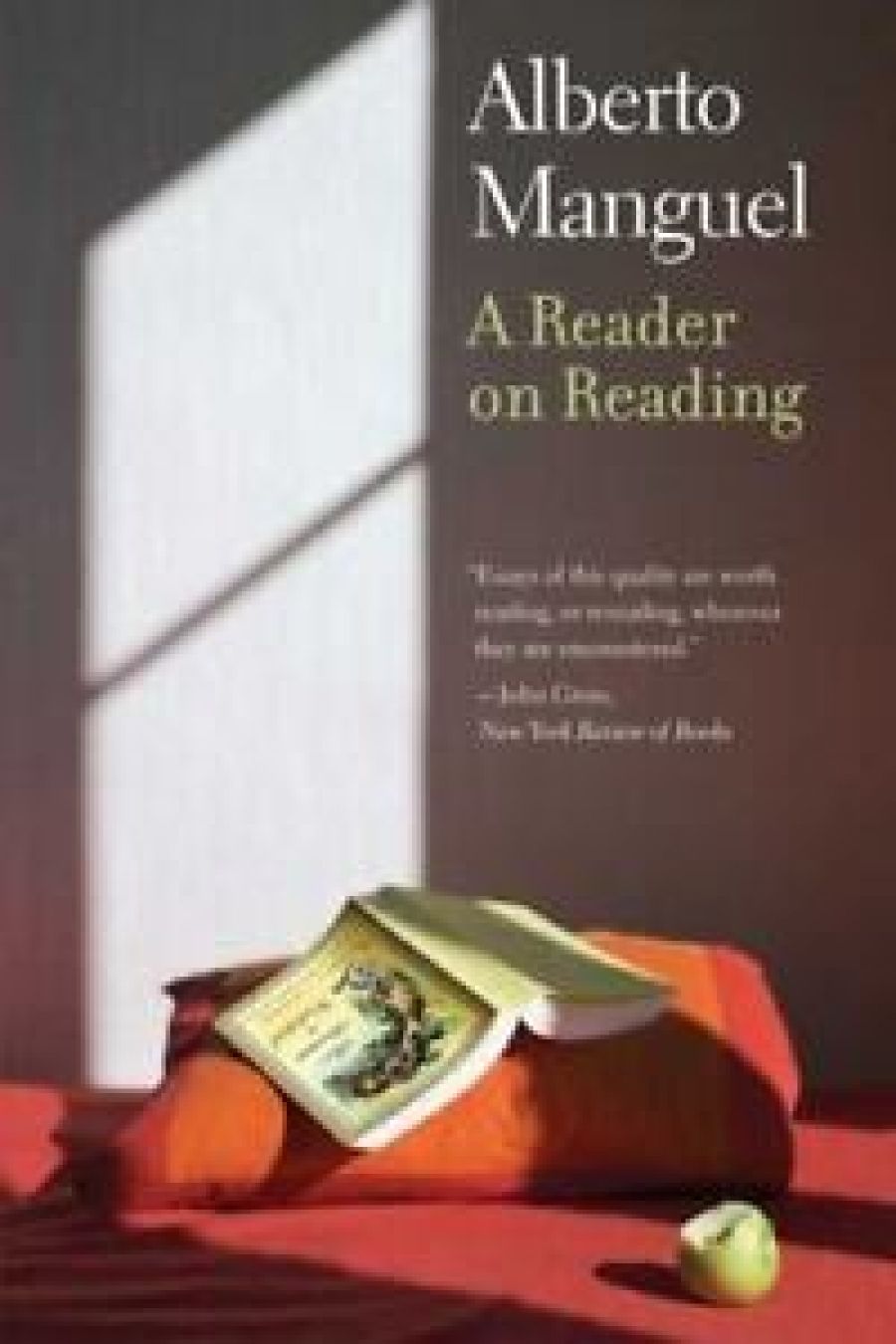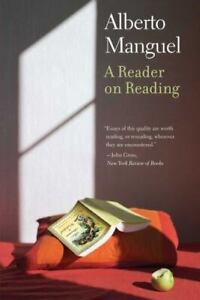
- Free Article: No
- Contents Category: Non-fiction
- Review Article: Yes
- Article Title: The greedy reader
- Article Subtitle: Seductive essays from Alberto Manguel
- Online Only: No
- Custom Highlight Text:
During 2007 I became enamoured of podcasting. The Canadian Broadcasting Commission’s Big Ideas and Elaine Wachtel’s Writers and Company were among my favourite programs and I would podcast these each week, irrespective of the topic or the interviewee. Thus I heard Alberto Manguel’s CBC Massey Lectures, a series of five wonderful presentations collectively titled ‘The City of Words’. It was not simply the content of these lectures; Manguel’s delivery is lyrical, intimate, andante and almost shockingly seductive. These lectures worked on me as reading does, drawing me in and then spinning me out to numerous other readings. Some of the books prompted by the lectures were rereadings, such as Alfred Döblin’s Berlin Alexanderplatz and Borges’s stories others were new to me, and some, including Gilgamesh, had long been on my must-read list. Manguel provided the necessary nudge.
- Book 1 Title: A Reader on Reading
- Book 1 Biblio: Yale University Press, $49.95 hb, 314 pp
- Book 1 Cover Small (400 x 600):

I had known Alberto Manguel only from A History of Reading (1996), but as a result of the Massey lectures I plunged into his work, including A Reading Diary (2004), The City of Words (2007), Homer’s The Iliad and The Odyssey: A Biography (2007) and The Library at Night (2009). Manguel remains a generous and intimate guide whose wonder at books and reading is pungent. Always one finds a sense of privilege in his pages, a response familiar to all dedicated readers.
A Reader on Reading is a collection of Manguel’s shorter writings drawn mainly from the past twelve years. It includes a handful of articles written between 1990 and 1998; one essay, ‘The Secret Sharer’, on the role of the editor, first appeared in 1987. Originally, these pieces were lectures or introductions to books, chapters in anthologies, journal essays or contributions to newspapers. The thirty-nine pieces are grouped into eight sections with each article and each section introduced with a quote from either Alice’s Adventures in Wonderland or Through the Looking-Glass.
All of Manguel’s reading passions are to be found in this collection: Borges, Homer, Don Quixote, the Alice books and the act of reading itself. In the company of a Manguel book, one cannot fail to be infected with his passions. Previously I had never read the Alice books in their unexpurgated form, and nor has this bothered me, but as a result of this collection I find myself acquiring a copy.
I am disappointed to discover that Alice fails to stir me in the way it so obviously stirs Manguel. Perhaps there is a ‘readiness stage’ for specific books, like the developmental reading readiness stage; perhaps if you miss it there is no making up the deficit. I can pick up any A.A. Milne book, all of which have been part of my life since infancy, and find myself transported to a familiar absurd little world: funny, comfortable, curious, a world that continues to inform me about individuals and their idiosyncrasies, and to delight. The Just So Stories of Rudyard Kipling can fill me with a warm and deep appreciation. But Carroll has quite a different effect. There is familiarity by virtue of the Alice books being among those canonical works that have seeped into the common culture, but they simply do not have that lush familiar embrace or that press of meaning common to my own lifelong books.
There are political pieces in this collection, not surprising from an author who lost friends and acquaintances in Argentina’s dirty war. ‘The Death of Che Guevara’ (originally published in 1997, in TLS) is a stunning essay on the making of an activist. In two other essays, ‘In Memoriam’ and ‘Room for the Shadow’, Manguel writes of an inspiring teacher, the sort of person all bookish children need but often do not find. This teacher introduced the young Manguel to many great writers and critics, and fostered his love of literature. Manguel’s gratitude continued for years, until he learned that the teacher had denounced many of his former students to the military authorities. The notion that great worth and evil actions can issue from the same person was explored in Manguel’s subsequent novel News from a Foreign Country Came (1991). By Manguel’s own admission he is not a novelist, but neither is he the all-suffering, sweat-falling-from-the-brow struggling writer. On the contrary: ‘the reader I am judges the writer I managed to become with amused tolerance.’
Manguel delves into the power of books and the subversive nature of reading, notably in ‘The Voice that Says I’ and ‘The Library of the Wandering Jew’. Read, but at your peril. As Manguel reminds us, every book carries within its pages connections to other books, together with the possibility of knowledge and understanding that may be too difficult to bear.
There are some lovely embedded references in this collection. ‘At the Mad Hatter’s Table’, a conference paper dealing with the contemporary drive to value everything in economic terms, Manguel writes: ‘If financial profit is the final goal, then perfection of a kind is what we are after’, echoing the first line of Auden’s powerful short poem ‘Epitaph on a Tyrant’.
Included in this collection are essays on translation, on the connection between reading and writing, on gay literature, on books as travel, and much more. A few of the pieces are slight, but rather than omit them you want the ideas to be explored more fully. Two articles are comprised entirely of lists: ‘The Ideal Library’ and ‘The Ideal Reader’, in which Manguel shares his passion as a reader with a high-energy indulgence. ‘Writing on the margins is a sign of the ideal reader.’ ‘The readers who committed suicide after reading Werther were not ideal but merely sentimental readers.’ The list form invites you to consider your own essential qualities of books and readings. In fact, nearly all the pieces in this collection will have you engaging, sharing or disagreeing with the sentiments expressed on the page.
In acknowledging the electronic revolution currently occurring in reading, Manguel argues that text presented electronically reads differently from text read on the page, and, most importantly, that different readings serve different purposes. In Manguel’s universe, books do most certainly have a future.
It may be that, of all the instruments we have invented to help us along the path of self-discovery, books are the most useful, the most practical, the most concrete. By lending words to our bewildering experience, books become compasses that embody the four cardinal points: mobility and stability, self-reflection and the gift of looking outward. (‘The Library of the Wandering Jew’)
Adam Zagajewski, in his introduction to the Collected Poems of Zbigniew Herbert, describes the central figure in Herbert’s ‘Mr Cogito’ sequence as a porte-parole. It is an apt description for Manguel. He shows in these essays how moments spent reading are pregnant with previously unrelated readings. The reader makes new connections, his or her world expands – no mouse existence for the greedy reader, and the dedicated reader is always greedy. The reader spends hours alone – but never truly alone – reading in a silent room – but never really silent – the outside world enhanced by that jostling, demanding, captivating other world created by the interaction between a book and an active mind. This is reading, and it is truly marvellous.


Comments powered by CComment